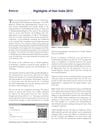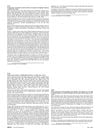4 citations,
December 2021 in “Applied sciences” Micro-needling with low-level light therapy effectively increases hair growth in people with mild to moderate hair loss.
 November 2023 in “European medical journal. Dermatology”
November 2023 in “European medical journal. Dermatology” Early diagnosis and new treatments are crucial to prevent permanent hair loss in scarring alopecia.
 December 2023 in “EPRA international journal of multidisciplinary research”
December 2023 in “EPRA international journal of multidisciplinary research” Alopecia areata causes sudden hair loss, has genetic links, and can be managed but not cured.
 5 citations,
September 2017 in “Plastic and Aesthetic Research”
5 citations,
September 2017 in “Plastic and Aesthetic Research” Low dose cyclical nutrition therapy can consistently and safely improve hair growth and density without needing anti-androgens.
 1 citations,
January 2012 in “International Journal of Trichology”
1 citations,
January 2012 in “International Journal of Trichology” Hair India 2012 was a successful international event focused on combating fake trichology practices and discussing various hair health topics.
 May 2022 in “Journal of Cosmetic Dermatology”
May 2022 in “Journal of Cosmetic Dermatology” The authors suggest a method for hair transplantation in fibrosing alopecia pattern distribution to improve treatment outcomes and cover bald areas.
 April 2019 in “Actas Dermo-Sifiliográficas”
April 2019 in “Actas Dermo-Sifiliográficas” The conclusion is that having both Frontal Fibrosing Alopecia and Discoid Lupus Erythematosus may suggest a shared immune response in certain people, and a mix of antimalarial drugs and 5-alfa-reductase inhibitors is recommended for treatment.
1 citations,
January 2022 in “Clinical Cases in Dermatology” A rare scalp condition was successfully treated with specific medications after 9 months.
 February 2024 in “International journal of medical science and clinical research studies”
February 2024 in “International journal of medical science and clinical research studies” CCCA is a scarring hair disorder mainly affecting people of African descent, needing better awareness and treatment.
 April 2019 in “Dermatology reports”
April 2019 in “Dermatology reports” A 12-year-old boy's hair fully regrew after 8 weeks of treatment for tinea capitis, and dermoscopy was useful for diagnosis and monitoring.
1 citations,
May 2016 in “Aktuelle Dermatologie” Trichoscopy helps monitor inflammation in Lichen planopilaris.
 May 2024 in “Australasian journal of dermatology”
May 2024 in “Australasian journal of dermatology” A man with a type of skin lymphoma had unusual yellowish skin growths despite normal blood lipid levels, and treatment reduced some symptoms but not the growths.
 September 2021 in “CRC Press eBooks”
September 2021 in “CRC Press eBooks” Acne keloidalis nuchae is a hair loss condition affecting men of African descent, causing scar-like bumps on the scalp and neck.
 26 citations,
August 2013 in “Australasian Journal of Dermatology”
26 citations,
August 2013 in “Australasian Journal of Dermatology” Certain scalp patterns can indicate the severity and activity of hair loss in Turkish alopecia patients.
 June 2022 in “Journal of Dermatology Research”
June 2022 in “Journal of Dermatology Research” Using 448-kHz Capacitive-Resistive Electrothermal Therapy can help increase hair density and prevent hair loss in women.
 2 citations,
March 2021 in “Journal of Cosmetic Dermatology”
2 citations,
March 2021 in “Journal of Cosmetic Dermatology” Combining platelet-rich plasma therapy with low dose oral minoxidil improved hair growth in men with hair loss, with slightly higher satisfaction at the higher minoxidil dose.
October 2023 in “Asian journal of pharmaceutical and clinical research” Standardized data is essential for diagnosing scalp and hair conditions in males.
 April 2024 in “Journal of cosmetic dermatology”
April 2024 in “Journal of cosmetic dermatology” Children with alopecia areata have more exclamation mark hairs and fewer yellow dots than adults.
 January 2023 in “Skin appendage disorders”
January 2023 in “Skin appendage disorders” Hair transplants in male pattern baldness typically look normal under a microscope.
 11 citations,
May 2017 in “Journal of The European Academy of Dermatology and Venereology”
11 citations,
May 2017 in “Journal of The European Academy of Dermatology and Venereology” Scalp threading with polydioxanone threads is a promising, effective, and safe method for hair regrowth.

Hair loss treatment using stem cells from baby teeth was effective for 75% of men tested, with mild side effects. A scoring system may predict how well this treatment works.
 April 2023 in “World Journal Of Advanced Research and Reviews”
April 2023 in “World Journal Of Advanced Research and Reviews” Cosmetic products or emotional factors might contribute to Frontal Fibrosing Alopecia, and trichoscopy is useful for diagnosis.
 January 2023 in “Skin appendage disorders”
January 2023 in “Skin appendage disorders” Hair restoration surgery can change the appearance of hair when examined with a special magnifying tool.
December 2021 in “IP Indian journal of clinical and experimental dermatology” Trichoscopy is a useful tool for diagnosing female pattern hair loss.
 5 citations,
December 2018 in “Journal of Cosmetic Dermatology”
5 citations,
December 2018 in “Journal of Cosmetic Dermatology” PRP treatment improves hair count, density, and reduces hair loss in AGA patients.
 January 2022 in “Klinicheskaya dermatologiya i venerologiya”
January 2022 in “Klinicheskaya dermatologiya i venerologiya” Trichoscopy can diagnose hair loss by looking for common signs like uneven hair thickness, "yellow dots," and more thin hairs, which are found in both men and women.
December 2021 in “Acta dermato-venereologica” A deep learning model accurately predicts male hair loss types using scalp images.
 April 2016 in “Journal of The American Academy of Dermatology”
April 2016 in “Journal of The American Academy of Dermatology” The study found that Temporal Triangular Alopecia often starts in early childhood, while Folliculitis Decalvans is characterized by tufted hairs and redness around hair follicles.
 2 citations,
May 2022 in “Clinical, Cosmetic and Investigational Dermatology”
2 citations,
May 2022 in “Clinical, Cosmetic and Investigational Dermatology” Trichoscopy and pathological examination both have unique benefits and cannot completely replace each other in evaluating hair.
 September 2019 in “IP Indian journal of clinical and experimental dermatology”
September 2019 in “IP Indian journal of clinical and experimental dermatology” Hormones and iron deficiency are linked to female pattern hair loss, and hair thinning patterns are similar across different types of this condition.























